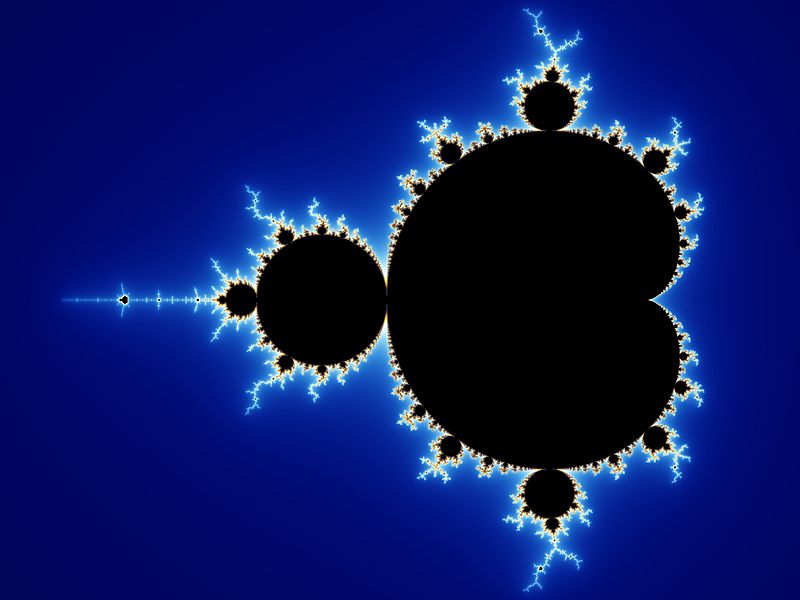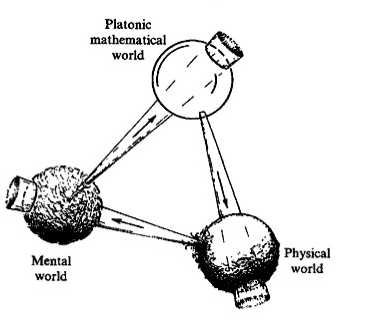Well, I would disagree. However, this is on the basis of semantics. |
|
Results 1 to 6 of 6
Thread: Triality
-
07-25-2008 12:23 AM #1Banned


- Join Date
- Aug 2005
- Posts
- 9,984
- Likes
- 3084
Triality
Probably not a real word but it'll make sense in a sec.
Okay, basically I read about this in The Road to Reality by Roger Penrose and it seemed very sensible, although I had a few disagreements with it.
You often have very staunch supporters of science who'll say that physical reality is the only reality. This is not correct. Look at the Mandelbrot set below, a famous fractal based on a very simple mathematical process; square a complex number and then add the complex number to it, then square your result and add the complex number again, then square that result and add the complex number again; if the number stays low, it's part of the Mandelbrot set, but if it shoots off to infinity, it is not. For example, -1: square it and -1, you get 0. Square that and -1, you're back to -1. Therefore -1 is part of the set. When you plot the results, you get this (shading is based upon how quickly a value shoots off to infinity, if it does):

This thing is not only very beautiful, it is also remarkable. It is in fact infinitely complex. Here's an example of a zoom into it:
http://commons.wikimedia.org/wiki/Im...elbrot_set.jpg
You could go forever and still find new things. The relevant questions are these:
1. Is it real?
Most certainly it is, it is not something that was invented but rather something that was discovered. Physical reality can be seen to be an approximation of this set in many places, not vice versa (the set being a product of reality).
2. Is it a part of physical reality?
Definitely not, physical reality cannot contain this in all its detail because it is infinitely complex. That would require infinite matter. All of the images on computers and print outs are mere approximations. Neither is it, by the way, a part of mental reality, for no mind can hold infinite quantities of information.
The conclusion that we must make is that physical reality is not the only reality. There is also platonic reality. This is just as real as what is tactile to our senses. Other evidence for this is how physical reality seems to be an approximation of mathematical laws, such as the law of attraction being inversely proportional to the square of distance. I would personally suggest that this shows that science cannot hold all the answers; certainly if you define science as the study of empirical, measurable reality, because mathematics is not tangible. The study of such things is left to philosophy and mathematics.
I'll take a moment here to address spiritual reality; there is no such thing. God is the product of primitive man's attempts to explain a reality which seemed designed for him. We now know that that wasn't the case but rather a delusion brought about by ignorance of the anthropic principle; man came to be made for that physical reality through natural selection, and really we should abandon God. The promise of eternal life stops people from doing that unfortunately, but just to make it clear: religious reality has nothing to do with what I'm talking about. There is no consciousness which designed the universe; there is no evidence for such a consciousness.
There was another reality which Penrose suggested though, distinct from platonic and tangible:

It seems reasonable, definitely. Qualia... by definition they have no lodging in physical reality, nor can they be put down to mathematics I do not think; can do you describe a quale with equations? I don't think so.
The major problem I have with Penrose's diagram is the arrows. They imply causality, in a way, and that definitely cannot be true because you get a cycle of causality and a chicken and egg paradox.
My belief in the nature of mental reality is that it is actually the product of a curious mash of both the platonic and the physical worlds. One of the most fascinating aspects of consciousness is how it makes causality a real, solid thing. Previously causality has been thought of as a mere abstract way of showing how one thing leads to another; when a man pushes his wife out of a hot air balloon as often happens in real life, we don't see that as
man applies force to wife --> causality --> wife accelerates out of balloon basket
but just as
man applies force to wife --> wife accelerates out of balloon basket
However causality becomes tangible when talking about neurons. The fact that one neuron causes another to fire is integral to the system developing 'purpose' and hence consciousness.
Such pure yeses and nos, such as the yesses and nos of neurons or absolute of consciousness which is either an existent or non existent property, is a stark contrast to physical reality, but feels more like mathematics in which absolutes are everywhere; physical reality is, according to quantum physics, actually very blurry. Things are not either there or not there; they are actually, for example, 80% maybe there 20% not there. However causality itself seems to be instrinsic to time, and we only find real time in physical reality, not eternal mathematics which is simply there. It is for that reason I think that mental reality may actually be more like a subset of phsyical and platonic reality:

What are people's thoughts on this? I thought it'd be nice to hear some metaphysical speculation in the philosophy board for once instead of the usual bitching about evolution with brainwashed goons.
-
07-25-2008 12:56 AM #2http://www.youtube.com/watch?v=N1eP84n-Lvw
Ich brauche keine Waffe.
Ich ermittle ausschlie▀lich mit dem Gehirn!
http://www.youtube.com/watch?v=N1eP84n-Lvw
-
07-25-2008 01:12 AM #3Banned


- Join Date
- Aug 2005
- Posts
- 9,984
- Likes
- 3084
lel

Okay, well, your point about whether or not 1 is real is a valid one (technically 1 is real because it has no imaginary part but uh... different issue). I think 1 does have meaning... for example, I think neurons must be distinct objects in reality for the reasons above, so there the number 1 has meaning. The Mandelbrot set was not hypothesised to exist by humans, it is a geometrical shape which computers found by accident. A flying panda bear isn't really a mathematical entity so I'm not sure if that would apply.
I think that qualia have no physical manifestations for several reasons. The fact that they are indescribable is one thing that leads me to that conclusion... another is that we can imagine our neurons firing without any qualia involved. We are basically complex reaction systems... make an analogy to, for example, a thermostat. Thermostats do not have qualia, although they are also signal processing mechanisms built for that purpose. Qualia do not seem to change the way we act at all but are rather an extra layer; stripping that layer gives us a p-zombie and it's hard to argue against them or perform any physical test for them. I argued that quite poorly but the jist is in there somewhere.
About describing an equation without qualia... again it's interesting, but again, comparing to say, a computer... computers can represent and solve equations with no qualia. But then again is there any 'meaning' there..? Does mathematics only have meaning within consciousness, then? I really don't claim to know many of these answers at present, I'm mainly trying to provoke a discussion about what I think are the ultimate philosophical issues.Last edited by Xei; 07-25-2008 at 01:15 AM.
-
07-25-2008 10:11 PM #4Strate up Gaysta

- Join Date
- Jul 2008
- Gender

- Posts
- 94
- Likes
- 0
Can you imagine an infinitely high tower? Can you really? Or, can you only imagine its blueprints?
-
07-25-2008 10:35 PM #5
Xei, do you think the "Platonic" world and "Mental" world are the other planes New Agers talk about? IE they talk about the Etheral Plane and different Planes one can acces in the Astral. Whats your opinion on this?
Some are born to sweet deleight
Some are born to endless night
-
07-26-2008 12:02 AM #6Banned


- Join Date
- Aug 2005
- Posts
- 9,984
- Likes
- 3084
I think pretty much all New Age beliefs are just as faulty as the religious ones I mentioned. I remember there was a thread a while back in which it was asked, 'what exactly IS another plane of reality?', and nobody had any clue as to what the answer was. Basically it's all just meaningless words in the end.
They often talk about the other planes as other aspects of physical reality, such as astral projecting which basically sounds like normal reality except you float around and see freaky stuff... to me that's clearly just some kind of pyschological phenomenon associated with sleep. The only reality we can experience is by definition the tangible, the physical.




 LinkBack URL
LinkBack URL About LinkBacks
About LinkBacks




 Reply With Quote
Reply With Quote


Bookmarks